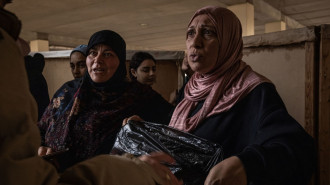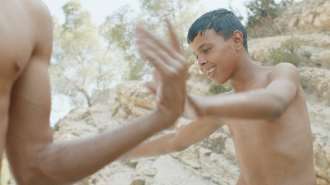The Things I Would Tell You: Capturing the diverse voices of British Muslim women
In a society where Muslim women are still struggling to have their voices heard, The Things I would Tell You comes as quite the timely collection.
A compilation of work by British Muslim women, published by Saqi Books, it "aims to dispel the narrow image of what a Muslim woman – particularly a British Muslim woman – looks and lives like," says Sabrina Mahfouz, editor and contributor, in the opening of the the book.
And it does exactly that; it provides a series of very different pieces by very different women. From short stories, to poetry, essays and plays, to spoken word pieces, The Things I would Tell You is a heterogeneous piece of work that successfully illustrates the diversity among Muslim women.
This representation, Mahfouz writes, is key: "It never fails to surprise me how much representation can empower and how much non- or misrepresentation can disempower. We should never underestimate this, and we must do whatever we can to challenge the current dominant narrative."
 |
|
| The book was published in 2017 by Saqi Books [Saqi] |
The writers in this anthology have a few things in common; they are women, British and call themselves Muslim. With a total of 22 different authors, the plurality of voices offers a lot of variety in 'Muslimness'.
Far from providing a biased opinion of what a Muslim woman should be like, the book gives a platform to women with a refreshing outlook in degrees of faith and the practice of religion.
There is also great diversity in age: from fifteen-year-olds to much more senior writers, their experiences vary from a lot to none.
But their experience is not the only factor in determining the quality of writing, all the pieces are definitely not equally good. Some are very strong, others aren't. A few of the writings feel cliché and unoriginal, some are unrelatable (that, of course, depends on the reader) but most are good. A handful of the pieces are downright brilliant and glorious.
Chimene Suleyman's short story Us is a great illustration of what an Islamophobic assault feels like for a visibly Muslim woman. Aliyah Hasinah Holder's New Blood, a spoken word piece, feels genuine and very relatable. The Girl Next Door, Kamilah Shamsie's contribution in the form of a short story, is a captivating and funny piece of writing. Sabrina Mahfouz's play Battleface is a powerful piece on the reality and ugliness of the counter-terrorism policy in the UK.
The Right Word is a surprising and fascinating poem by British-Pakistani writer Imtiaz Dharker; it was written after 9/11 and attempts to give terrorists a form of humanity that is normally denied to them. It allows an interesting shift of perspective in a situation where it is not socially accepted to do so. Instead of being portrayed as monsters, she tries to give them other names, exploring issues of labels and language.
Aisha Mirza's essay Staying Alive Through Brexit – Racism, Mental Health and Emotional Labour is about her research on the mental health effects of oppression that immigrants and their children suffer. She calls out the 'real culprits,' the middle class "who think they are good white people but are actually people with power who never listen because they don't have to."
She describes the "soul-destroying racism" that characterises life in Europe for people of colour, and calls out on the danger of this racism: "If anything isn't done, we are going to explode and you will explode with us."
Her words describe suffering in the most painful and heartbreaking manner: "We explode every day and we piece ourselves together again. We explode for our ancestors, when we don't expect it, and then again when we remember. We explode every time our trust is abused, every time it becomes obvious no one heard us, every time we have to retreat, thicken our walls that keep us locked in, angry, safe. We explode." It is probably the strongest non-fiction piece in the book.
 |
The Things I would Tell You is a powerful collection of writings that aptly represents the plurality of Muslim voices |  |
British-Palestinian author Selma Debbagh's short story is hauntingly touching. Last Assignment to Jenin features a female protagonist in her mid-thirties full of regrets for her past failed relationships. She interviews witnesses of Palestinians who have been killed to collect evidence of Israeli war crimes. At the opening of the story we find out that she should never have asked her ex (whom she still loves) to come pick her up from her assignment in Jenin – which would literally be the end of him.
The story follows her interview with the family of a recent attack, while she is haunted by hallucinations of death and by the ghosts of killed Palestinian children. The piece is painfully morbid and full of tragedy and perhaps the best short story in the collection.
Ahdaf Soueif's essay Mezzaterra is another strong piece of non-fiction. In this, the Egyptian writer explains many aspects of the difficulties of being a Muslim and/or Arab immigrant in the UK. She describes the situation when she first arrived in the eighties, a time of great turmoil in the Middle East – and of great Western 'meddling' into Arab affairs.
She links this to the issue of misrepresentation in the media: "If the New World Order was a mechanism to control the Arab and Muslim worlds then I felt that the media of the West was complicit in it; for they always represented those worlds in terms that excused or even invited the imposition of control."
She adds, "It was as though a simple-mindedness descended on the media when it reported on matters to do with Arabs, Islam and, in particular, Palestine."
She criticises the way the media portrays the Arab world as essentially passive, primitive and hopeless and never portrays Arabs as agents of action, "except for terrorists and suicide bombers". This eighteen-page essay is very well researched and nuanced, it includes numbers and statistics and offers a great analysis of geopolitics in the Middle East for the last few decades.
The award for most mind-blowing piece in this book undoubtedly goes to the longest one in the book: British-Sudanese Leila Aboulela's play The Insider. The piece is a smart rewriting of French writer Albert Camus' novel The Outsider, in which the protagonist Meursault, an indifferent (white) French Algerian attends his mother's funeral and kills an Arab man on a beach a couple of days later. This Arab man is killed when he attacks Raymond, Meursault's friend, after he finds out Raymond has been sleeping with and beating his prostitute sister.
In Leila Aboulela's play, she gives the Arab man and his sister names, a story and a voice. She gives the characters two names respectively, Fatima/Fifi and Yusuf/Joseph; which are their original Arab name and a French version that they deem more adequate and modern. She writes the story from the perspective of the girl and shifts from two times, 'now' and 'then'.
In the 'now', Fatima is an elderly lady who lives with her grandson Yusuf (named after his deceased great-uncle, referred to as Joseph to avoid confusion).
Fatima has recollections of the past, the 'then', at the time of the Algerian Revolution, which is when the events that lead to her brother's killing happen. She has conversations with Fifi, her younger self, which she hallucinates, as well as with her dead brother. Fatima clearly suffers from mental health problems following the different traumas she has been subjected to: being a prostitute, being abused by her pimp Raymond, her brother's killing, which are all direct consequences of the colonial situation.
The play is refreshing in its representation of the Arab man: while in Camus' original text he is portrayed as a stereotypically angry and savagely subhuman who can only think of avenging his sister's honour. In Aboulela's play he is given humanity and is portrayed as a considerate man who takes care of his sister and genuinely helps her get better, until the pain becomes too big for him to handle.
Fatima says, "From the moment he saw me hurt, until that day on the beach, he never slept."
Another refreshing aspect is the way religion is represented. Instead of an oppressive force, it is a form of post-colonial liberation for Fatima, who finds solace and peace in her repentance. The story is enchanting, mesmerising and confusing, as it constantly goes in and out of reality, making one wonder whether the events really take place or not. The play is extremely well-wrought and loaded with strong emotion and pain.
The Things I would Tell You is a powerful collection of writings that aptly represents the plurality of Muslim voices.
The subjects and themes are extremely varied and different, and is for anyone interested in Muslim women's perspectives. It is well written, quite personal, delightfully woke and political, yet painful and emotionally draining at times, but definitely, never dull.
Order your copy of The Things I Would Tell You: British Muslim Women Write here.
Follow her on Twitter: @ilhamreads
The New Arab Book Club: Click on our Special Contents tab to read more book reviews and interviews with authors:


![Palestinians mourned the victims of an Israeli strike on Deir al-Balah [Getty]](/sites/default/files/styles/image_684x385/public/2024-11/GettyImages-2182362043.jpg?h=199d8c1f&itok=xSHZFbmc)


![The law could be enforced against teachers without prior notice [Getty]](/sites/default/files/styles/image_684x385/public/2178740715.jpeg?h=a5f2f23a&itok=hnqrCS4x)
 Follow the Middle East's top stories in English at The New Arab on Google News
Follow the Middle East's top stories in English at The New Arab on Google News


